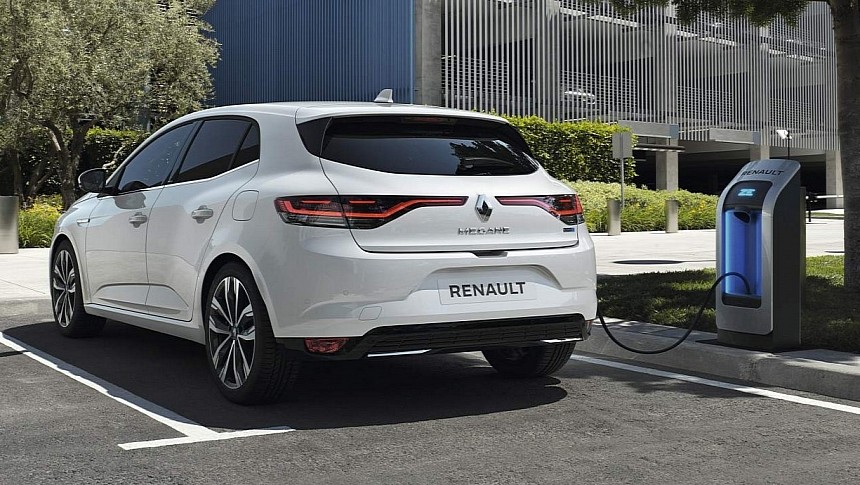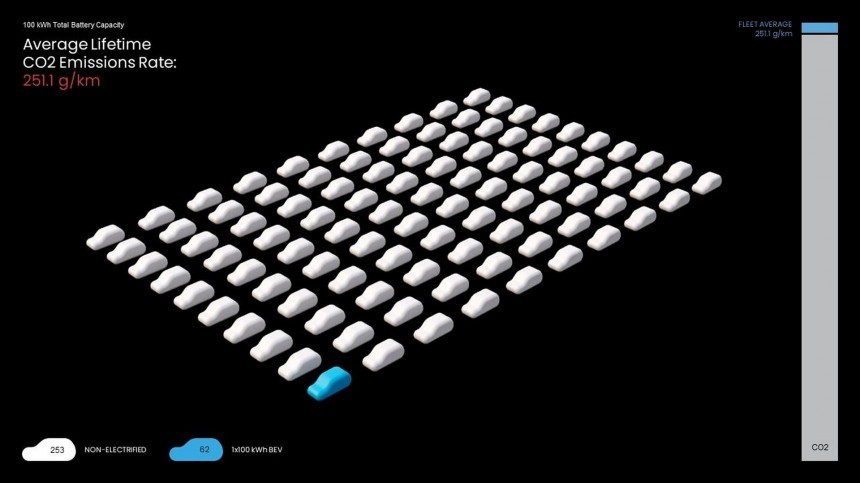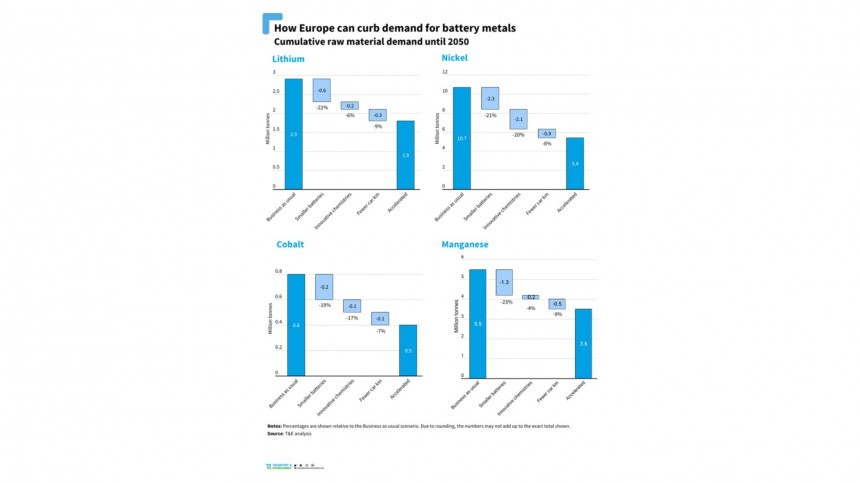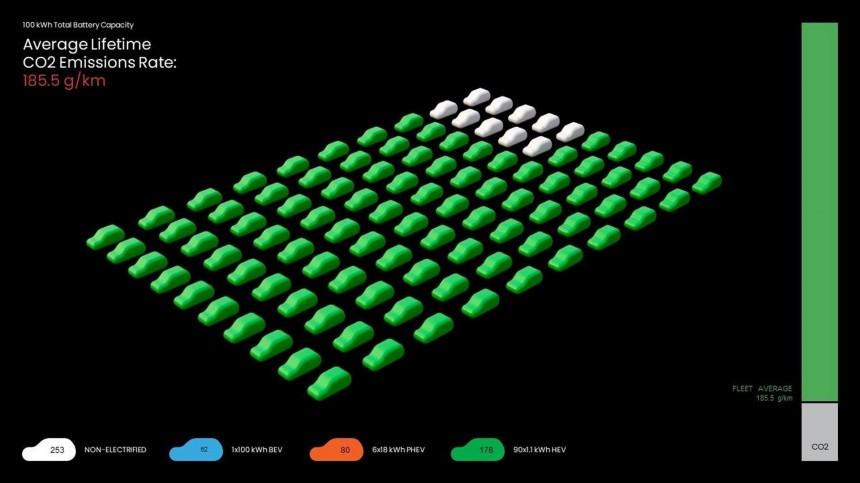Transport & Environment (T&E) does not like plug-in hybrid vehicles (PHEVs). It accused them more than once of greenwashing personal transportation and emitting more than automakers claim they do. That's controversial, considering car companies follow test protocols that give them the disclosed results. Anyway, it seems that T&E is indirectly and unwillingly defending PHEVs with a study that urges carmakers to make smaller battery electric vehicles (BEVs).
According to T&E, if BEVs sold in Europe were not as big as they currently are, the demand for raw materials to make batteries could drop by up to 49%. That said, it believes "governments and the EU must take action to reduce battery and car sizes, which is the single most effective measure to reduce metals demand." Ironically, this is what Gill Pratt has been saying for quite some time without urging politicians to impose anything: his solution is to advocate for smaller battery packs in vehicles – without necessarily reducing the cars themselves.
Toyota's chief scientist argued at this year's edition of the Davos World Economic Forum that it made more sense for decarbonization to have 90 cars with a 1.1-kWh battery pack than a single one with a 100-kWh component. Pratt said it was a more sensible use of the limited battery resources we currently have. T&E's concern about the same thing is what led it to its new recommendation: the organization knows how many more batteries will be necessary to have only BEVs running by 2050 and the environmental costs that may arise from that with mining.
Predictably, what Toyota's chief scientist said also applies to smaller BEVs. Whether they use a 25-kWh or a 50-kWh battery pack, these cells would help more if they were installed in hybrids or PHEVs. After all, having more cars burning less fuel has a broader impact than having fewer vehicles with no direct carbon emissions.
When he still led Audi, Markus Duesmann said future cars would have much smaller battery packs when the charging infrastructure was more widespread. That would make BEVs lighter and cheaper. The issue is that fast charging reduces the lifespan of battery packs, which would make replacement plans for them even more pressing than they currently are. Unlike what BEV advocates say, a battery pack will not last as much as the car – unless you are ok with having a vehicle that will inevitably die when its battery pack kicks the bucket. T&E could have proposed that. It didn't because it knows charging infrastructure would also need to improve. Charging stations also need a lot of raw materials to be built, such as tons of copper.
Pratt and T&E agree that smaller battery packs would be better, but Toyota's chief scientist proposition presents a more profound knowledge of the automotive market. The organization wants countries to impose "requirements on automakers to produce more entry-level" BEVs – as if governments could determine demand and market dynamics that easily. T&E misses that it would be pretty easy for carmakers to divide the massive battery packs into smaller units and sell more vehicles to lower their fleet emissions. What the organization did not seem to understand or chose to ignore is why they don't do that.
The answer is almost intuitive. As Alfred P. Sloan once said, automakers' goal is to make money making cars, not only to manufacture them. Entry-level BEVs do not sell at a profit nowadays. Bigger and more expensive vehicles are the only ones that currently offer carmakers any chance of making money selling BEVs. It has to do with the cost of battery packs. Even cheaper chemistries like LFP and brand-new sodium-ion cells may not do the trick.
On top of that, small vehicles are the second or third car for families – for those that can afford more than one, obviously. Usually, people go for a single car, one that can fulfill all their needs. That said, small cars are not the best sellers in Europe or any developed country, which means they will achieve lower sales volumes than C-segment vehicles or the SUVs T&E wants manufacturers to stop selling. According to Green NCAP, the Dacia Spring is the most efficient vehicle currently for sale in Europe, but it is the Tesla Model Y – a much larger BEV – that led sales charts. If automakers reduce the size of their new vehicles, customers will buy used ones. Car companies produce SUVs because they are what people want to buy, period.
This is where hybrids and PHEVs may help with efforts to reduce climate change. With small battery packs that could fit the daily driving needs of most people, plug-in hybrids would save cell resources and carbon emissions in the cars customers really want to purchase. Hybrids would save them even more but would not prevent direct carbon emissions for lacking electric-only driving modes. Despite that, their emission levels would be very low compared to those of a regular internal combustion-engined (ICE) vehicle, which is something anyone claiming to fight climate change should celebrate.
T&E suggested other measures to cut the demand for raw materials, such as "building fewer roads, cutting the space available for private cars, and charging for parking." In other words, by making car owners' lives more difficult so that they stop driving as often. It is like trying to prevent a forest from burning by cutting all the trees. That is only possible if governments promote public transport. The fact that they don't is what makes cars necessary in the first place. Even when public transport options exist, frequent strikes can make them very unreliable.
The organization also wants governments to stimulate "shared transport and active travel," meaning carpooling, car sharing, and bikes. That completely ignores the convenience of owning an automobile and why most people do not adopt these other transportation options regardless of what governments may do. Any feasible solution will only work if it matches what customers want. Acknowledging that smaller battery packs are better than large ones is a significant step. Recognizing they may be used in vehicles other than smaller BEVs would make the decarbonization mission way easier.
Toyota's chief scientist argued at this year's edition of the Davos World Economic Forum that it made more sense for decarbonization to have 90 cars with a 1.1-kWh battery pack than a single one with a 100-kWh component. Pratt said it was a more sensible use of the limited battery resources we currently have. T&E's concern about the same thing is what led it to its new recommendation: the organization knows how many more batteries will be necessary to have only BEVs running by 2050 and the environmental costs that may arise from that with mining.
Predictably, what Toyota's chief scientist said also applies to smaller BEVs. Whether they use a 25-kWh or a 50-kWh battery pack, these cells would help more if they were installed in hybrids or PHEVs. After all, having more cars burning less fuel has a broader impact than having fewer vehicles with no direct carbon emissions.
Pratt and T&E agree that smaller battery packs would be better, but Toyota's chief scientist proposition presents a more profound knowledge of the automotive market. The organization wants countries to impose "requirements on automakers to produce more entry-level" BEVs – as if governments could determine demand and market dynamics that easily. T&E misses that it would be pretty easy for carmakers to divide the massive battery packs into smaller units and sell more vehicles to lower their fleet emissions. What the organization did not seem to understand or chose to ignore is why they don't do that.
The answer is almost intuitive. As Alfred P. Sloan once said, automakers' goal is to make money making cars, not only to manufacture them. Entry-level BEVs do not sell at a profit nowadays. Bigger and more expensive vehicles are the only ones that currently offer carmakers any chance of making money selling BEVs. It has to do with the cost of battery packs. Even cheaper chemistries like LFP and brand-new sodium-ion cells may not do the trick.
This is where hybrids and PHEVs may help with efforts to reduce climate change. With small battery packs that could fit the daily driving needs of most people, plug-in hybrids would save cell resources and carbon emissions in the cars customers really want to purchase. Hybrids would save them even more but would not prevent direct carbon emissions for lacking electric-only driving modes. Despite that, their emission levels would be very low compared to those of a regular internal combustion-engined (ICE) vehicle, which is something anyone claiming to fight climate change should celebrate.
The organization also wants governments to stimulate "shared transport and active travel," meaning carpooling, car sharing, and bikes. That completely ignores the convenience of owning an automobile and why most people do not adopt these other transportation options regardless of what governments may do. Any feasible solution will only work if it matches what customers want. Acknowledging that smaller battery packs are better than large ones is a significant step. Recognizing they may be used in vehicles other than smaller BEVs would make the decarbonization mission way easier.












































